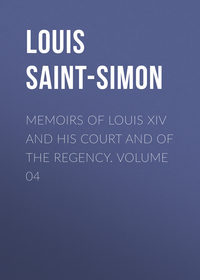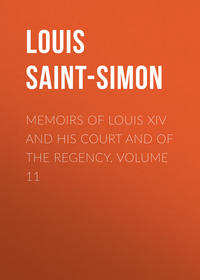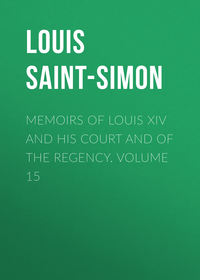 полная версия
полная версияMemoirs of Louis XIV and His Court and of the Regency. Volume 02
Two days afterwards he was passing by the same place when the same vision appeared to him, and he was addressed in the same terms. Fresh threats of punishment were uttered if he did not comply, and he was ordered to go at once to the Intendant of the province, who would assuredly furnish him with money, after saying what he had seen. This time the farrier was convinced there was no delusion in the matter; but, halting between his fears and doubts, knew not what to do, told no one what had passed, and was in great perplexity. He remained thus eight days, and at last had resolved not to make the journey; when, passing by the same spot, he saw and heard the same vision, which bestowed upon him so many dreadful menaces that he no longer thought of anything but setting out immediately. In two days from that time he presented himself, at Aix, to the Intendant of the province, who, without a moment's hesitation, urged him to pursue his journey, and gave him sufficient money to travel by a public conveyance. Nothing more of the story was ever known.
The farrier had three interviews with M. de Pomponne, each of two hours' length. M. de Pomponne rendered, in private, an account of these to the King, who desired him to speak more fully upon the point in a council composed of the Ducs de Beauvilliers, Pontchartrain, Torcy, and Pomponne himself; Monseigneur to be excluded. This council sat very long, perhaps because other things were spoken of. Be that as it may, the King after this wished to converse with the farrier, and did so in his cabinet. Two days afterwards he saw the man again; at each time was nearly an hour with him, and was careful that no one was within hearing.
The day after the first interview, as the King was descending the staircase, to go a-hunting, M. de Duras, who was in waiting, and who was upon such a footing that he said almost what he liked, began to speak of this farrier with contempt, and, quoting the bad proverb, said, "The man was mad, or the King was not noble." At this the King stopped, and, turning round, a thing he scarcely ever did in walking, replied, "If that be so, I am not noble, for I have discoursed with him long, he has spoken to me with much good sense, and I assure you he is far from being mad."
These last words were pronounced with a sustained gravity which greatly surprised those near, and which in the midst of deep silence opened all eyes and ears. After the second interview the King felt persuaded that one circumstance had been related to him by the farrier, which he alone knew, and which had happened more than twenty years before. It was that he had seen a phantom in the forest of Saint Germains. Of this phantom he had never breathed a syllable to anybody.
The King on several other occasions spoke favourably of the farrier; moreover, he paid all the expenses the man had been put to, gave him a gratuity, sent him back free, and wrote to the Intendant of the province to take particular care of him, and never to let him want for anything all his life.
The most surprising thing of all this is, that none of the ministers could be induced to speak a word upon the occurrence. Their most intimate friends continually questioned them, but without being able to draw forth a syllable. The ministers either affected to laugh at the matter or answered evasively. This was the case whenever I questioned M. de Beauvilliers or M. de Pontchartrain, and I knew from their most intimate friends that nothing more could ever be obtained from M. de Pomponne or M. de Torcy. As for the farrier himself, he was equally reserved. He was a simple, honest, and modest man, about fifty years of age. Whenever addressed upon this subject, he cut short all discourse by saying, "I am not allowed to speak," and nothing more could be extracted from him. When he returned to his home he conducted himself just as before, gave himself no airs, and never boasted of the interview he had had with the King and his ministers. He went back to his trade, and worked at it as usual.
Such is the singular story which filled everybody with astonishment, but which nobody could understand. It is true that some people persuaded themselves, and tried to persuade others, that the whole affair was a clever trick, of which the simple farrier had been the dupe. They said that a certain Madame Arnoul, who passed for a witch, and who, having known Madame de Maintenon when she was Madame Scarron, still kept up a secret intimacy with her, had caused the three visions to appear to the farrier, in order to oblige the King to declare Madame de Maintenon queen. But the truth of the matter was never known.
The King bestowed at this time some more distinctions on his illegitimate children. M. du Maine, as grand-master of the artillery, had to be received at the Chambre des Comptes; and his place ought to have been, according to custom, immediately above that of the senior member. But the King wished him to be put between the first and second presidents; and this was done. The King accorded also to the Princesse de Conti that her two ladies of honour should be allowed to sit at the Duchesse de Bourgogne's table. It was a privilege that no lady of honour to a Princess of the blood had ever been allowed. But the King gave these distinctions to the ladies of his illegitimate children, and refused it to those of the Princesses of the blood.
In thus according honours, the King seemed to merit some new ones himself. But nothing fresh could be thought of. What had been done therefore at his statue in the Place des Victoires, was done over again in the Place Vendome on the 13th August, after midday. Another statue which had been erected there was uncovered. The Duc de Gesvres, Governor of Paris, was in attendance on horseback, at the head of the city troops, and made turns, and reverences, and other ceremonies, imitated from those in use at the consecration of the Roman Emperors. There were, it is true, no incense and no victims: something more in harmony with the title of Christian King was necessary. In the evening, there was upon the river a fine illumination, which Monsieur and Madame went to see.
A difficulty arose soon after this with Denmark. The Prince Royal had become King, and announced the circumstance to our King, but would not receive the reply sent him because he was not styled in it "Majesty." We had never accorded to the Kings of Denmark this title, and they had always been contented with that of "Serenity." The King in his turn would not wear mourning for the King of Denmark, just dead, although he always did so for any crowned head, whether related to him or not. This state of things lasted some months; until, in the end, the new King of Denmark gave way, received the reply as it had been first sent, and our King wore mourning as if the time for it had not long since passed.
Boucherat, chancellor and keeper of the seals, died on the 2nd of September. Harlay, as I have previously said, had been promised this appointment when it became vacant. But the part he had taken in our case with M. de Luxembourg had made him so lose ground, that the appointment was not given to him. M. de la Rochefoucauld, above all, had undermined him in the favour of the King; and none of us had lost an opportunity of assisting in this work. Our joy, therefore, was extreme when we saw all Harlay's hopes frustrated, and we did not fail to let it burst forth. The vexation that Harlay conceived was so great, that he became absolutely intractable, and often cried out with a bitterness he could not contain, that he should be left to die in the dust of the palace. His weakness was such, that he could not prevent himself six weeks after from complaining to the King at Fontainebleau, where he was playing the valet with his accustomed suppleness and deceit. The King put him off with fine speeches, and by appointing him to take part in a commission then sitting for the purpose of bringing about a reduction in the price of corn in Paris and the suburbs, where it had become very dear. Harlay made a semblance of being contented, but remained not the less annoyed. His health and his head were at last so much attacked that he was forced to quit his post: he then fell into contempt after having excited so much hatred. The chancellorship was given to Pontchartrain, and the office of comptroller-general, which became vacant at the same time, was given to Chamillart; a very honest man, who owed his first advancement to his skill at billiards, of which game the King was formerly very fond. It was while Chamillart was accustomed to play billiards with the King, at least three times a week, that an incident happened which ought not to be forgotten. Chamillart was Counsellor of the Parliament at that time. He had just reported on a case that had been submitted to him. The losing party came to him, and complained that he had omitted to bring forward a document that had been given into his hands, and that would assuredly have turned the verdict. Chamillart searched for the document, found it, and saw that the complainer was right. He said so, and added, —"I do not know how the document escaped me, but it decides in your favour. You claimed twenty thousand francs, and it is my fault you did not get them. Come to-morrow, and I will pay you." Chamillart, although then by no means rich, scraped together all the money he had, borrowing the rest, and paid the man as he had promised, only demanding that the matter should be kept a secret. But after this, feeling that billiards three times a week interfered with his legal duties, he surrendered part of them, and thus left himself more free for other charges he was obliged to attend to.
The Comtesse de Fiesque died very aged, while the Court was at Fontainebleau this year. She had passed her life with the most frivolous of the great world. Two incidents amongst a thousand will characterise her. She was very straitened in means, because she had frittered away all her substance, or allowed herself to be pillaged by her business people. When those beautiful mirrors were first introduced she obtained one, although they were then very dear and very rare. "Ah, Countess!" said her friends, "where did you find that?"
"Oh!" replied she, "I had a miserable piece of land, which only yielded me corn; I have sold it, and I have this mirror instead. Is not this excellent? Who would hesitate between corn and this beautiful mirror?"
On another occasion she harangued with her son, who was as poor as a rat, for the purpose of persuading him to make a good match and thus enrich himself. Her son, who had no desire to marry, allowed her to talk on, and pretended to listen to her reasons: She was delighted—entered into a description of the wife she destined for him, painting her as young, rich, an only child, beautiful, well-educated, and with parents who would be delighted to agree to the marriage. When she had finished, he pressed her for the name of this charming and desirable person. The Countess said she was the daughter of Jacquier, a man well known to everybody, and who had been a contractor of provisions to the armies of M. de Turenne. Upon this, her son burst out into a hearty laugh, and she in anger demanded why he did so and what he found so ridiculous in the match.
The truth was, Jacquier had no children, as the Countess soon remembered. At which she said it was a great pity, since no marriage would have better suited all parties. She was full of such oddities, which she persisted in for some time with anger, but at which she was the first to laugh. People said of her that she had never been more than eighteen years old. The memoirs of Mademoiselle paint her well. She lived with Mademoiselle, and passed all her life in quarrels about trifles.
It was immediately after leaving Fontainebleau that the marriage between the Duc and Duchesse de Bourgogne was consummated. It was upon this occasion that the King named four gentlemen to wait upon the Duke,– four who in truth could not have been more badly chosen. One of them, Gamaches, was a gossip; who never knew what he was doing or saying— who knew nothing of the world, or the Court, or of war, although he had always been in the army. D'O was another; but of him I have spoken. Cheverny was the third, and Saumery the fourth. Saumery had been raised out of obscurity by M. de Beauvilliers. Never was man so intriguing, so truckling, so mean, so boastful, so ambitious, so intent upon fortune, and all this without disguise, without veil, without shame! Saumery had been wounded, and no man ever made so much of such a mishap. I used to say of him that he limped audaciously, and it was true. He would speak of personages the most distinguished, whose ante-chambers even he had scarcely seen, as though he spoke of his equals or of his particular friends. He related what he had heard, and was not ashamed to say before people who at least had common sense, "Poor Mons. Turenne said to me," M. de Turenne never having probably heard of his existence. With Monsieur in full he honoured nobody. It was Mons. de Beauvilliers, Mons. de Chevreuse, and so on; except with those whose names he clipped off short, as he frequently would even with Princes of the blood. I have heard him say many times, "the Princesse de Conti," in speaking of the daughter of the King; and "the Prince de Conti," in speaking of Monsieur her brother-in-law! As for the chief nobles of the Court, it was rare for him to give them the Monsieur or the Mons. It was Marechal d'Humieres, and so on with the others. Fatuity and insolence were united in him, and by dint of mounting a hundred staircases a day, and bowing and scraping everywhere, he had gained the ear of I know not how many people. His wife was a tall creature, as impertinent as he, who wore the breeches, and before whom he dared not breathe. Her effrontery blushed at nothing, and after many gallantries she had linked herself on to M. de Duras, whom she governed, and of whom she was publicly and absolutely the mistress, living at his expense. Children, friends, servants, all were at her mercy; even Madame de Duras herself when she came, which was but seldom, from the country.
Such were the people whom the King placed near M. le Duc de Bourgogne.
The Duc de Gesvres, a malicious old man, a cruel husband and unnatural father, sadly annoyed Marechal de Villeroy towards the end of this year, having previously treated me very scurvily for some advice I gave him respecting the ceremonies to be observed at the reception by the King of M. de Lorraine as Duc de Bar. M. de Gesvres and M. de Villeroy had both had fathers who made large fortunes and who became secretaries of state. One morning M. de Gesvres was waiting for the King, with a number of other courtiers, when M. de Villeroy arrived, with all that noise and those airs he had long assumed, and which his favour and his appointments rendered more superb. I know not whether this annoyed De Gesvres, more than usual, but as soon as the other had placed himself, he said, "Monsieur le Marechal, it must be admitted that you and I are very lucky." The Marechal, surprised at a remark which seemed to be suggested by nothing, assented with a modest air, and, shaking his head and his wig, began to talk to some one else. But M. de Gesvres had not commenced without a purpose. He went on, addressed M. de Villeroy point-blank, admiring their mutual good fortune, but when he came to speak of the father of each, "Let us go no further," said he, "for what did our fathers spring from? From tradesmen; even tradesmen they were themselves. Yours was the son of a dealer in fresh fish at the markets, and mine of a pedlar, or, perhaps, worse. Gentlemen," said he, addressing the company, "have we not reason to think our fortune prodigious—the Marechal and I?" The Marechal would have liked to strangle M. de Gesvres, or to see him dead—but what can be done with a man who, in order to say something cutting to you, says it to himself first? Everybody was silent, and all eyes were lowered. Many, however, were not sorry to see M. de Villeroy so pleasantly humiliated. The King came and put an end to the scene, which was the talk of the Court for several days.
Omissions must be repaired as soon as they are perceived. Other matters have carried me away. At the commencement of April, Ticquet, Counsellor at the Parliament, was assassinated in his own house; and if he did not die, it was not the fault of his porter, or of the soldier who had attempted to kill him, and who left him for dead, disturbed by a noise they heard. This councillor, who was a very poor man, had complained to the King, the preceding year, of the conduct of his wife with Montgeorges, captain in the Guards, and much esteemed. The King prohibited Montgeorges from seeing the wife of the councillor again.
Such having been the case, when the crime was attempted, suspicion fell upon Montgeorges and the wife of Ticquet, a beautiful, gallant, and bold woman, who took a very high tone in the matter. She was advised to fly, and one of my friends offered to assist her to do so, maintaining that in all such cases it is safer to be far off than close at hand. The woman would listen to no such advice, and in a few days she was no longer able. The porter and the soldier were arrested and tortured, and Madame Ticquet, who was foolish enough to allow herself to be arrested, also underwent the same examination, and avowed all. She was condemned to lose her head, and her accomplice to be broken on the wheel. Montgeorges managed so well, that he was not legally criminated. When Ticquet heard the sentence, he came with all his family to the King, and sued for mercy. But the King would not listen to him, and the execution took place on Wednesday, the 17th of June, after mid-day, at the Greve. All the windows of the Hotel de Ville, and of the houses in the Place de Greve, in the streets that lead to it from the Conciergerie of the palace where Madame Ticquet was confined, were filled with spectators, men and women, many of title and distinction. There were even friends of both sexes of this unhappy woman, who felt no shame or horror in going there. In the streets the crowd was so great that it could not be passed through. In general, pity was felt for the culprit; people hoped she would be pardoned, and it was because they hoped so, that they went to see her die. But such is the world; so unreasoning, and so little in accord with itself.
CHAPTER XVI
The year 1700 commenced by a reform. The King declared that he would no longer bear the expense of the changes that the courtiers introduced into their apartments. It had cost him more than sixty thousand francs since the Court left Fontainebleau. It is believed that Madame de Mailly was the cause of this determination of the King; for during the last two or three years she had made changes in her apartments every year.
A difficulty occurred at this time which much mortified the King. Little by little he had taken all the ambassadors to visit Messieurs du Maine and de Toulouse, as though they were Princes of the blood. The nuncio, Cavallerini, visited them thus, but upon his return to Rome was so taken to task for it, that his successor, Delfini, did not dare to imitate him. The cardinals considered that they had lowered themselves, since Richelieu and Mazarm, by treating even the Princes of the blood on terms of equality, and giving them their hand, which had not been customary m the time of the two first ministers just named. To do so to the illegitimate offspring of the King, and on occasions of ceremony, appeared to them monstrous. Negotiations were carried on for a month, but Delfini would not bend, and although in every other respect he had afforded great satisfaction during his nunciature, no farewell audience was given to him; nor even a secret audience. He was deprived of the gift of a silver vessel worth eighteen hundred francs, that it was customary to present to the cardinal nuncios at their departure: and he went away without saying adieu to anybody.
Some time before, M. de Monaco had been sent as ambassador to Rome. He claimed to be addressed by the title of "Highness," and persisted in it with so much obstinacy that he isolated, himself from almost everybody, and brought the affairs of his embassy nearly to a standstill by the fetters he imposed upon them in the most necessary transactions. Tired at last of the resistance he met with, he determined to refuse the title of "Excellence," although it might fairly belong to them, to all who refused to address him as "Highness." This finished his affair; for after that determination no one would see him, and the business of the embassy suffered even more than before. It is difficult to comprehend why the King permitted such a man to remain as his representative at a foreign Court.
Madame de Navailles died on the 14th of February: Her mother, Madame de Neuillant, who became a widow, was avarice itself. I cannot say by what accident or chance it was that Madame de Maintenon in returning young and poor from America, where she had lost her father and mother, fell in landing at Rochelle into the hands of Madame de Neuillant, who lived in Poitou. Madame de Neuillant took home Madame de Maintenon, but could not resolve to feed her without making her do something in return. Madame de Maintenon was charged therefore with the key of the granary, had to measure out the corn and to see that it was given to the horses. It was Madame de Neuillant who brought Madame de Maintenon to Paris, and to get rid of her married her to Scarron, and then retired into Poitou.
Madame de Navailles was the eldest daughter of this Madame de Neuillant, and it was her husband, M. de Navailles, who, serving under M. le Prince in Flanders, received from that General a strong reprimand for his ignorance. M. le Prince wanted to find the exact position of a little brook which his maps did not mark. To assist him in the search, M. de Navailles brought a map of the world! On another occasion, visiting M. Colbert, at Sceaux, the only thing M. de Navailles could find to praise was the endive of the kitchen garden: and when on the occasion of the Huguenots the difficulty of changing religion was spoken of, he declared that if God had been good enough to make him a Turk, he should have remained so.
Madame de Navailles had been lady of honour to the Queen-mother, and lost that place by a strange adventure.
She was a woman of spirit and of virtue, and the young ladies of honour were put under her charge. The King was at this time young and gallant. So long as he held aloof from the chamber of the young ladies, Madame de Navailles meddled not, but she kept her eye fixed upon all that she controlled. She soon perceived that the King was beginning to amuse himself, and immediately after she found that a door had secretly been made into the chamber of the young ladies; that this door communicated with a staircase by which the King mounted into the room at night, and was hidden during the day by the back of a bed placed against it. Upon this Madame de Navailles held counsel with her husband. On one side was virtue and honour, on the other, the King's anger, disgrace, and exile. The husband and wife did not long hesitate. Madame de Navailles at once took her measures, and so well, that in a few hours one evening the door was entirely closed up. During the same night the King, thinking to enter as usual by the little staircase, was much surprised to no longer find a door. He groped, he searched, he could not comprehend the disappearance of the door, or by what means it had become wall again. Anger seized him; he doubted not that the door had been closed by Madame de Navailles and her husband. He soon found that such was the case, and on the instant stripped them of almost all their offices, and exiled them from the Court. The exile was not long; the Queen-mother on her death- bed implored him to receive back Monsieur and Madame de Navailles, and he could not refuse. They returned, and M. de Navailles nine years afterwards was made Marechal of France. After this Madame de Navailles rarely appeared at the Court. Madame de Maintenon could not refuse her distinctions and special favours, but they were accorded rarely and by moments. The King always remembered his door; Madame de Maintenon always remembered the hay and barley of Madame de Neuillant, and neither years nor devotion could deaden the bitterness of the recollection.
From just before Candlemas-day to Easter of this year, nothing was heard of but balls and pleasures of the Court. The King gave at Versailles and at Marly several masquerades, by which he was much amused, under pretext of amusing the Duchesse de Bourgogne. At one of these balls at Marly a ridiculous scene occurred. Dancers were wanting and Madame de Luxembourg on account of this obtained an invitation, but with great difficulty, for she lived in such a fashion that no woman would see her. Monsieur de Luxembourg was perhaps the only person in France who was ignorant of Madame de Luxembourg's conduct. He lived with his wife on apparently good terms and as though he had not the slightest mistrust of her. On this occasion, because of the want of dancers, the King made older people dance than was customary, and among others M. de Luxembourg. Everybody was compelled to be masked. M. de Luxembourg spoke on this subject to M. le Prince, who, malicious as any monkey, determined to divert all the Court and himself at the Duke's expense. He invited M. de Luxembourg to supper, and after that meal was over, masked him according to his fancy.











